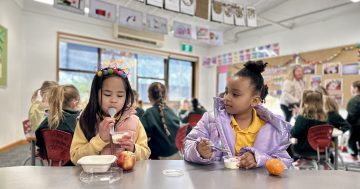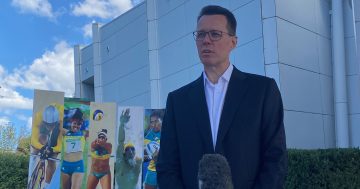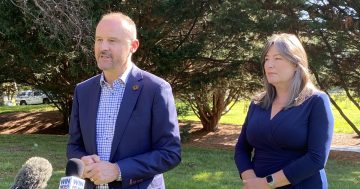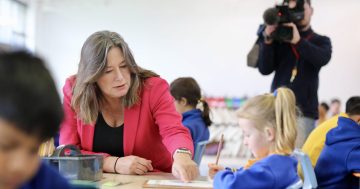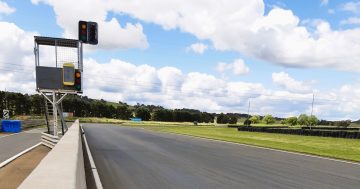In our continuing series of Email Interviews with local candidates in the coming Federal Election we bring you Bob McMullan MP – the Federal Member for Fraser and the first of our respondents from the Australian Labor Party.

Bob McMullan’s responses, in full and unedited, can be found below:
Q1. Provide a short (no greater and 200 word) employment application style Resume (CV), including what work you have done apart from being a politician or political staffer or party/union/lobby employee and what experience or qualifications do you have with regard to economic management?
My academic training is principally as an economist, although I have also studied arts and public law. Whether this qualifies me to play a role in economic management is for others to judge.
I chose to use my economic qualifications to advance the interests of workers rather than employers and I am proud of the role I was able to play as an industrial advocate and union official.
As well as a union and party official, and in addition to the usual vacation jobs, I have worked at a super-phosphate factory, as a public servant and a university tutor.
While working for the Labor Party I was a Director and Company Secretary of a number of small to medium-sized companies.
Q2. What would you like to see as the first piece of legislative change brought about by your Government? What are your personal goals for your first year representing the ACT?
The first piece of legislative change I would like to see is the repeal of Workchoices and the restoration of fairness in Australian Workplaces.
At a local level I would like to see a decentralisation of Commonwealth Government departments to Gungahlin, to ease the demand for parking facilities in Civic and reduce the level of traffic to the city centre.
I will also be working for an upgrade of the roads servicing Canberra International Airport.
Q3. What private opinions do you hold which are different to those of your party? On which issues do you disagree with your Party’s stated position?
While there will always be issues on which any thinking individual will disagree with the group or party of which they are a member, I accept that the overwhelming majority of voters in Fraser who vote for me do so because I am the Labor candidate, not for any personal attributes I may have, although I hope one or two may appreciate those.
Q4. Are you in favour of fixed election terms? Why or why not and if so what length of terms are you in favour of and why?
I am in favour of fixed election terms of four years for preference.
Q5. Do you think that it is important for the Prime Minister and their family to live in Canberra? Why or why not?
Yes, I believe the Prime Minister should live in Canberra.
Q6. Do you consider that making observations about the structure and makeup of the other major political party as beneficial to your own party’s role in the election?
No
Q7. What are your thoughts on the permanent trading of water entitlements, as per the National Water Initiative
(http://www.dpmc.gov.au/water_reform/nwi.cfm), and do you believe that giving water a tradable, economic value is really the best method to ensure that this scarce Australian resource will be utilised sensibly in the future?
Labor supports the National Water Initiative. I believe the water reform process must continue, so we properly fix the over-allocation of water licences in the Murray Darling Basin, ensure harmony between the environment and consumptive use, and help address the impact of drought and climate change on water supply.
Labor believes that national water reform requires:
* a cooperative and constructive approach with State Governments to assist water reform and investment in urban and rural water infrastructure;
* full implementation of the National Water Initiative principles agreed to in 2004;
* fixing of the over-allocation of water licences once and for all, and the establishment of coherent, streamlined rules which ensure the problem of over-allocation never recurs;
* recognition that economic instruments including water trading are necessary to address the fact that water has been over-allocated, undervalued and misdirected;
* proper consultation with key stakeholders in the Murray Darling Basin, including all water users, farmers, water scientists, environment groups and the broader community to ensure the adoption and consistent use of efficient agricultural practices;
* returning sufficient water to the rivers in the Murray Darling Basin to ensure the long term health of all rivers, wetlands and all connected groundwater systems in the Basin and, as a result, ensure the health of the communities and businesses that rely on the health of those rivers; and
* measures to ensure industrial and urban water users adapt to maximise water efficiency.
Q8. Canberra has a large student population and Govt funding per capita for public education facilities seems to be on the slide with there being an apparent shift towards encouraging more people to enter the private education sector. What are your thoughts on this?
What initiatives would you pursue in regard to HECS fees, full fee paying uni courses, increasing/decreasing Austudy payments, funding for education/R&D/communications infrastructure and assistance or encouragement to private sector research and technology companies?
What measures will you take to ensure the best possible education is
available to all Australians?
Labor recognises that education is both a social issue – making sure all Australians have equal opportunity to live up to their full potential – and an economic issue – retaining our future prosperity, about ensuring our future international competitiveness.
That is why a Rudd Labor Government will invest more in education, whether it’s early childhood, primary schools, secondary schools, vocational education and training, on-the-job training or universities.
A Rudd Labor Government will:
* Invest $450 million to give all Australian four year olds 15 hours of preschool education – delivered through fun, play-based
activities – a week, delivered by a qualified teacher;
* Invest up to $34 million each year to provide 1,500 new university places in early childhood education;
* Halve the HECS debts for 10,000 early childhood graduates working in areas of need;
* Invest $16.9 million to support the rollout of the Australian Early Development Index in every Australian primary school; and
* Invest $32.5 million to roll out the Brotherhood of St. Lawrence Home Interaction Program in 50 disadvantaged communities across Australia to help parents prepare their children for school.
Labor will also:
* Invest $1 billion over four years to turn every secondary school in Australia into a digital school – Federal Labor’s National Secondary School Computer Fund will allow every Australian student in years 9-12 to have access to their own school computer.
* Provide secondary schools with between $500,000 and $1.5 million, as part of its $2.5 billion Trades Training Centres in Schools Plan, to build or upgrade trades training facilities;
* provide a new 50% Education Tax Refund to help families of around 2.3 million school-age children meet the costs of education.
* Invest $84 million to ensure all trades training students have access to one day a week of on the job training and provide these students with a Job Ready Certificate;
* Invest $62.5 million as part of the Local Schools Working Together program to fund the construction of shared facilities between Government and Non-Government schools;
* Establish a rigorous, quality National Curriculum for all Australian students from kindergarten to year 12 focussing on English,
Maths, Science, History, Languages and Geography;
* Implement a National Literacy and Numeracy Action Plan requiring all trainee teachers to achieve rigorous literacy and numeracy standards as a condition of their graduation;
* Invest $68.6 million to establish a National Asian Languages and Studies in Australian Schools Program; and
* Provide financial incentives to encourage young Australians to study and teach maths and science.
* A Rudd Labor Government will fund an additional 450,000 skilled training places over the next four years – 200,000 more places than the Howard Government and through Skilling Australia support up to 65,000 apprenticeships over the next four years.
* Double from 44,000 to 88,000 the number of undergraduate students receiving a Commonwealth Learning Scholarship, including two new categories of scholarships for studies in areas of national priority and to assist students moving interstate to study specialist courses.
* Double from 4,800 to 9,600 the number of postgraduate students receiving an Australian Postgraduate Award for their PhD or Masters by Research over four years from the start of the 2009 university year.
Labor will encourage more businesses to increase their local training programs. To enable Australian industry to develop, innovate and grow requires support to undertake higher level training, and expand the qualification base of its workers.
The ongoing development of a national system of vocational education and training, including related national industry standards, must be based on expert advice from those directly involved, both employers and employees.
Labor supports a strengthened national network of Industry Skills Councils, with members from both employer associations and unions.
Federal Labor will invest $100 million over four years in a Manufacturing Network to foster innovation in small and medium
Australian manufacturing businesses.
Up to 3,000 manufacturing businesses will benefit from the program each year – becoming more productive, better able to compete in global markets, and able to take advantage of new business opportunities arising from the challenge of climate change.
It will help businesses succeed and create great jobs for our kids.
Five new Centres will be established in Sydney, Melbourne, Adelaide, Perth and Tasmania and Queensland’s QMI Solutions will be linked in with the network.
It is expected that about 1,000 small and medium manufacturing enterprises a year will receive hands-on support from the Network. A further 2,000 firms will receive advice, attend workshops and participate in innovation networking activities. The Network’s benchmarking services will be provided free to small and medium sized manufacturing businesses.
Australia simply must be more innovative if we are to compete in global markets. The new network will be established by a new Commonwealth department bringing together responsibility for innovation, industry, science and research, but the Network will be at arms length from government, including a combination of expert staff and outsourced consultants.
Q9. What is the single most pressing issue in your electorate (local electorate issue – not a broader issue that has an impact on your electorate) and how do you plan on addressing it?
The most pressing local issue is the development of an employment base for Gungahlin. For the past six months I have been campaigning for policy to ensure fast and efficient location of employment in Gungahlin.
Q10. Suppose you and I are stuck in an elevator for 5 minutes. You know nothing about me other than I’m enrolled to vote in your electorate. What do you say to convince me to vote for you?
Press the alarm button, now!












